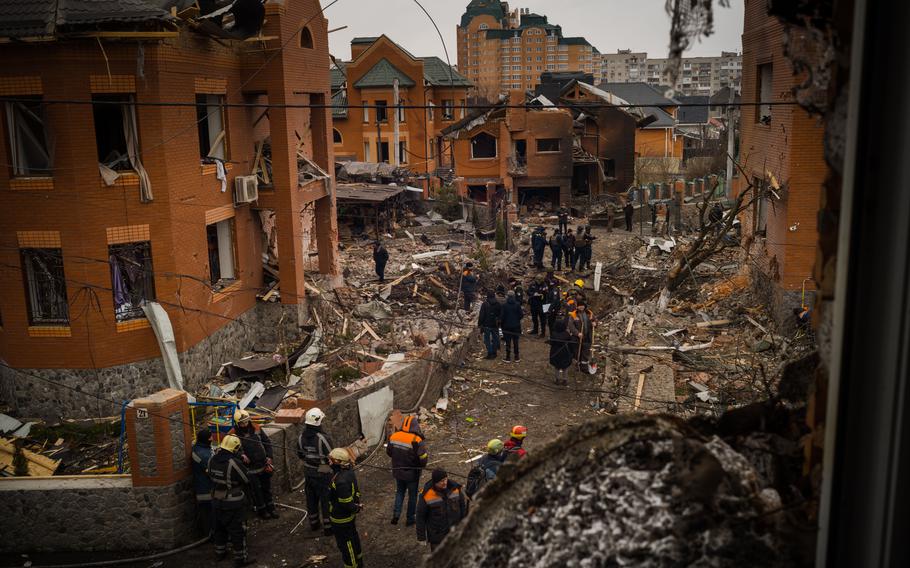
Damaged buildings in a residential area of Bila Tserkva, Ukraine, on Saturday, March 5, 2022. (Wojciech Grzedzinski for The Washington Post)
BILA TSERKVA, Ukraine - In the secret location that has become a makeshift camp for the local administration of this city 50 miles south of Kyiv, officials and commanders met Saturday morning to discuss security and supply lines to the capital and the east.
As they debated whether they were prepared for a Russian advance, an explosion boomed in the distance, sending everyone rushing to an underground bunker.
"We have no idea what happened," Khokhol, a woodworker-turned-local militia leader whose nom de guerre is a derogatory term used by Russians for Ukrainians, said into his phone. Then he jumped into his pickup truck outside and drove toward the rising smoke.
This city of around 200,000 people would be a strategic prize in any Russian effort to choke off Kyiv, but for the moment it remains at the mouth of one of the few relatively safe passages in and out of the capital. Streams of people fleeing Kyiv clog the checkpoints here as they make their long drive toward safety.
Bila Tserkva is also a hub for humanitarian aid and military deliveries into the capital and further east. Much of the energy of the military volunteers and city officials here is focused on getting the right materials to the places they are needed. The stalling of Russia's 40-mile convoy of tanks of military vehicles in their effort to surround Kyiv has allowed this essential corridor to fortify and remain open - for the moment, at least.
"We've had some time to prepare," said Khokhol, 36, who served with the Ukrainian military in the east in 2014 and 2015 after Russia annexed Crimea. But they still expect Russian forces to attempt to close off this relatively safe passage.
"They wouldn't bomb it unless it was a strategic point," he said.
Airstrikes have struck sporadically since Russia launched its invasion, hitting mostly infrastructure and military targets. The city has long had a strong military presence. But Saturday's blast, which officials say was caused by a Russian rocket, struck a residential area.
Khokhol raced through largely deserted streets to the blast site, the eggs and pasta that he'd been planning to take to his family, who have evacuated to a nearby village, sliding around the back seat. By the time he arrived, firetrucks had arrived at the large crater in the middle of a cluster of red-brick homes built for the well-to-do around 15 years ago.
Some were scorched black; the roofs of several buildings had been ripped entirely off. The blast had hit a gas line; the vapors shimmered in the air as firefighters watched flames jump from the earth.
Karina Maniukina, 16, was making pancakes in her kitchen when the blast struck the street outside. "There was just an orange light," she said. There was dried blood on the side of her face where she'd been hit by the spray of glass. "I thought I was going to die."
She was home alone at the time. Her mother and brother were out at the market. She saw a young teenage boy being taken away with glass in his abdomen. Others said an older woman who had suffered injuries to her face was hospitalized, but no one was killed.
A neighbor helped pick glass shards out of Maniukina's neck as she stood in the blown-out kitchen. Others cleaned and swept. Outside her home, investigators pulled twisted fragments of metal out of the wreckage to send for further study. With no military infrastructure nearby, no one was sure what the target might have been.
Maniukina's family had considered fleeing the city, but Karina's mother had decided to stay to help displaced children.
The mother returned home; she sat down to play the family's white grand piano in their glass-strewn living room. Now, like so many others here, they were preparing to leave their home.
"We will go somewhere," Karina said. Perhaps that will be Poland, or the Carpathian mountains. They aren't sure where. "Bila Tserkva is very dangerous now."
Those who have stayed are turning their efforts to war. When Russia invaded, Khokhol decided to join with friends and former soldiers to make their own unit, rather than enlist the local territorial defense force.
They procure what they can from abroad, and volunteers focus on bringing it in over the border.
"That's what we do day and night," he said.
A contact with factories that made timber saws he used in his wood cutting business is now manufacturing crossed metal "hedgehogs" to block tanks.
"Getting bulletproof vests into the country is a nightmare," Khokhol said, so they've started making those themselves, too.
A local restaurant has become a sorting station for aid and medication, now stacked up on wooden shelves inside. "The places in the country give us their requests, and we send out exactly what they need," he said. The supplies go not only to the military, but also to internally displaced people, or anyone who needs it.
Truck drivers who are unwilling to go onward unload their cargo here.
"Then we find drivers with balls, and they go onward," he said.
___
The Washington Post's Anastacia Galouchka contributed to this report.